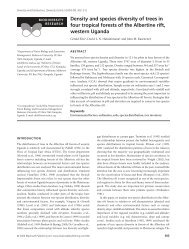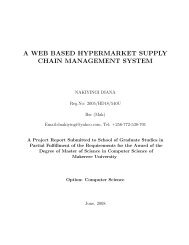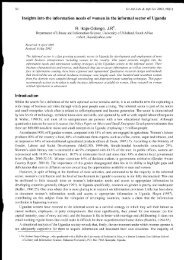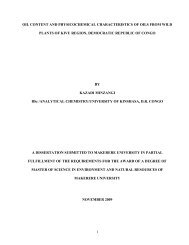THE UNIVERSITY OF LEIPZIG
THE UNIVERSITY OF LEIPZIG
THE UNIVERSITY OF LEIPZIG
Create successful ePaper yourself
Turn your PDF publications into a flip-book with our unique Google optimized e-Paper software.
institutions are assumed to influence preference formation. The second distinctive feature<br />
relates to the definition of institutions. Sociological institutionalism tends to define<br />
institutions broadly to include “not just formal rules, procedures or norms, but also the symbol<br />
systems, cognitive scripts and moral templates that provide the ‘frames of meaning’ guiding<br />
human action. 245 Taking into account its intellectual roots and distinctive features, it is not<br />
surprising that the substantive questions about organisational change sociological<br />
institutionalists tend to raise, are about why institutional practices originate or change.<br />
Brunsson, Czarniawska, Sahlin-Andersson, Christensen, Laegreid and Roevik are all<br />
proponents of this approach. 246<br />
The above scholars and their collaborators have produced a range of studies that seek to<br />
account for why and how institutional forms, procedures or symbols are diffused through<br />
organisational fields or across nations. This is what Hall and Taylor claim is typical for this<br />
branch of new institutionalism. Their explanations tend to emphasise that “organisations often<br />
adopt a new institutional practice not because it advances the means-ends efficiency of the<br />
organisation, but because it enhances the social legitimacy of the organisations or its<br />
participants. 247 March describes this as the logic of appropriateness in contrast to logic of<br />
consequence. 248 However, sociological institutionalists have developed a set of theories that<br />
are of growing interest to political scientists.<br />
These scholars are also interested in the study of cultures and norms as institutions. They<br />
emphasize the use of folkways in understanding patterns of behaviour and cognitive maps.<br />
They argue that, using these social institutional tools is critical in understanding of social<br />
structures as well as political and economic interactions. 249 Building upon their analyses of<br />
complex organizations, these scholars show the relationship between formal institutions, their<br />
structures, patterns of behaviour and beliefs. But to differentiate themselves from pure<br />
organizational theorists who stressed how behaviour was normatively based, sociological<br />
institutionalists stress that routines and habits are important aspects of actors underlying<br />
cognitive framework. 250<br />
Furthermore, scholars in this tradition argue that the informal institutions are fundamental<br />
when labouring to understand the non rational aspects of human communication and<br />
exchanges. Putting it clearly, this means that many of the institutional forms and procedures<br />
used by modern organizations were not adopted simply because they were the most efficient<br />
for the tasks at hand, but were in line with the transcendent rationality. 251 They argue that<br />
many of these forms and procedures should be seen as culturally specific practices, akin to the<br />
245<br />
Pierson, P. 2000. Path Dependence, Increasing Returns, and the Study of Politics. American Political Science<br />
Review 94:251-67.<br />
246<br />
Czarniawska, B. 1998. Narrating the Organization: Dramas of Institutional Identity. Chicago: University of<br />
Chicago Press.<br />
247<br />
Hall, P and R. Taylor, Opcit.<br />
248<br />
March, J. Opcit.<br />
249<br />
March , J and P. Olsen. 1989. Rediscovering Institutions. New York: Free Press.<br />
250<br />
George, T et al. 1987. Institutional Structure: Constituting State , Society and Individual, Beverly Hill: Sage.<br />
251<br />
Hall, P and Taylor,R. 1996. Political Science and the Three New Institutionalisms. Political Studies.<br />
50






